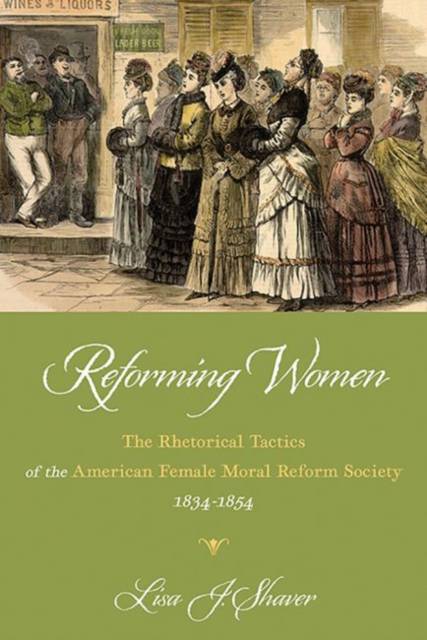
- Afhalen na 1 uur in een winkel met voorraad
- Gratis thuislevering in België vanaf € 30
- Ruim aanbod met 7 miljoen producten
- Afhalen na 1 uur in een winkel met voorraad
- Gratis thuislevering in België vanaf € 30
- Ruim aanbod met 7 miljoen producten
Zoeken
Reforming Women
The Rhetorical Tactics of the American Female Moral Reform Society, 1834-1854
Lisa Shaver
€ 76,45
+ 152 punten
Omschrijving
In Reforming Women, Lisa Shaver locates the emergence of a distinct women's rhetoric and feminist consciousness in the American Female Moral Reform Society. Established in 1834, the society took aim at prostitution, brothels, and the lascivious behavior increasingly visible in America's industrializing cities. In particular, female moral reformers contested the double standard that overlooked promiscuous behavior in men while harshly condemning women for the same offense. Their ardent rhetoric resonated with women across the country. With its widely-read periodical and auxiliary societies representing more than 50,000 women, the American Female Moral Reform Society became the first national reform movement organized, led, and comprised solely by women. Drawing on an in-depth examination of the group's periodical, Reforming Women delineates essential rhetorical tactics including women's strategic use of gender, the periodical press, anger, presence, auxiliary societies, and institutional rhetoric--tactics women's reform efforts would use throughout the nineteenth century. Almost two centuries later, female moral reformers' rhetoric resonates today as our society continues to struggle with different moral expectations for men and women.
Specificaties
Betrokkenen
- Auteur(s):
- Uitgeverij:
Inhoud
- Aantal bladzijden:
- 200
- Taal:
- Engels
- Reeks:
Eigenschappen
- Productcode (EAN):
- 9780822965480
- Verschijningsdatum:
- 29/01/2019
- Uitvoering:
- Paperback
- Formaat:
- Trade paperback (VS)
- Afmetingen:
- 150 mm x 226 mm
- Gewicht:
- 272 g

Alleen bij Standaard Boekhandel
+ 152 punten op je klantenkaart van Standaard Boekhandel
Beoordelingen
We publiceren alleen reviews die voldoen aan de voorwaarden voor reviews. Bekijk onze voorwaarden voor reviews.











